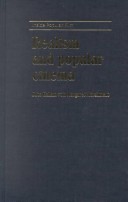Inside Popular Film
1 total work
This groundbreaking study engages with the theoretical aspects of realism - a long neglected area in film studies.. Contributes to an understanding of how popular films use realist forms to address contentious social and political issues such as social exclusion, war and violence.. Focusing on key moments in film history the authors examine the uses of realism in national cinemas as a context for their in-depth analysis of contemporary popular films.. A series of case studies examines the hybrid styles of realism used in recent filmmaking practice and the politics of these forms in relation to topics such as urban youth and domestic violence (Boyz N the Hood, La Haine, Once Were Warriors, Ladybird, Ladybird, Nil By Mouth), government conspiracies and war (Cry Freedom, JFK, Schindler's List), and serial killers (Henry, Portrait of a Serial Killer, Man Bites Dog, Natural Born Killers).. Will give rise to new directions in the theorisation of both popular film and realism in the cinema.
